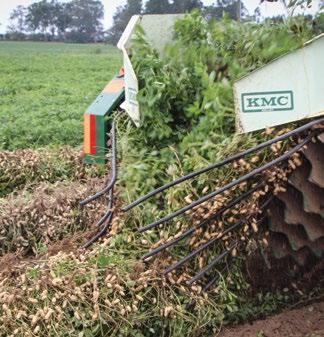
4 minute read
Delta Peanut
from Arkansas Grown
New Shelling Facility Adds Value to Arkansas Peanut Industry
For years, it didn’t make financial sense for peanut companies to contract Arkansas rowcrop farmers to grow peanuts. Logistics and transportation costs alone meant peanuts grown here were more costly than those grown nearby existing processing facilities. Therefore, a coalition of growers joined together to stimulate the region’s peanut industry. Production started in 2019 on a state-of-theart peanut shelling plant in Jonesboro, the centerpiece of a $70 million investment in the region’s burgeoning peanut industry. More than 60 farmers in Arkansas, southeast Missouri, and northern Louisiana are owner-investors in Delta Peanut, LLC. Tommy Jumper, the visionary behind the co-op says the shelling plant, storage warehouse, drying sheds, and shipping facility in northeast Arkansas will greatly expand opportunity for more peanut acreage in Arkansas. “Unlike other crops, peanuts can’t be stored in on-farm grain bins until they are processed and sold,” Jumper said. Until now, peanut companies trucked peanuts grown in the Midsouth to far-away selling points in west Texas and south Georgia. “Farmers here were frustrated that they couldn’t farm any more acres,” Jumper said. “Peanut crops are expensive since they have to be freighted to the selling points. The processing companies wanted peanut production in our area, but the shipping expenses were cost-prohibitive. There has to be a shelling plant here if there is ever going to be an opportunity for growers in Arkansas to raise more acres of peanuts.” Jumper, who spent more than three decades in the agriculture seed business, developed a self-described infatuation with the peanut industry several years ago. After discussions with industry leaders and due to his own familiarity with Arkansas farming, he became convinced northeast Arkansas could become a new hub for peanut growing. Jonesboro is strategically located near multiple peanut processing facilities: Planters in Fort Smith, Skippy Foods in Little Rock, and the J.M. Smucker Company in Memphis. “Downstream of our plant, we have an enviable logistics position for our customers,” Jumper said. The location in the Mid-South “stratifies the risk” to the nation’s peanut crop, much of which is cultivated closer to the Gulf Coast and more susceptible to storm damage. Arkansas’s soil and its water table are also a benefit. “We’re blessed here with very plentiful, sustainable, recharging irrigation,” he said. In 2019, Arkansas led the nation with a 5,200 pound yield per acre of peanuts. Evidence suggests peanuts work well in a rotation with cotton, noting that farmers who plant cotton a year after planting peanuts have seen a 200 to 300 pound-per-acre increase in cotton yield. “Our goal is to build profitability and create an opportunity for the owner-investors to build equity in their business.”
Advertisement

Allen Donner, President of the Arkansas Peanut Growers Association, says Arkansas growers are looking forward to having a shelling facility in the state.

“The Arkansas Peanut Growers Association is extremely pleased that a further-processing facility has chosen to build in northeast Arkansas,” Donner said. “The Delta Peanut facility will benefit all peanut producers in the region, not just the owner-investors of Delta Peanut. It adds value to the crop, provides opportunity for expansion of peanut acreage, and adds stability to the industry due to the facility’s longterm commitment.”
Peanuts are a full-season crop, typically planted in midApril and harvested between 140 and 150 days later. Unlike other crops, the process of cultivating peanuts involves first digging them out of the ground, leaving them to dry in the field for a few days, and then harvesting with a combine that separates the peanut from the vine.

Jumper praised Delta Peanut’s ownership structure, a model that shuns private equity companies and instead gives farmers what should be a transgenerational equity stake.
“Our goal is to build profitability and create an opportunity for the owner-investors to build equity in their business,” he said. “By having chosen this business model, every dollar of top-line revenue we create is invested locally with a local trucker, supplier, or utility company. Even the cash that we generate after expenses, and every dollar of top-line revenue, stays in the economy right here. I can’t think of any better, robust way for a group of growers to have an impact on their local economy.”
Delta Peanut owners currently farm about 30,000 acres of peanuts, and Jumper expects that number to grow.


STUDY AGRICULTURE IN ARKANSAS
Arkansas State University Jonesboro | (870) 972-2100 www.astate.edu/college/agriculture-and-technology

Arkansas Tech University Russellville | (844) 804-2628 www.atu.edu/agriculture
Southern Arkansas University Magnolia | (870) 235-4000 www.web.saumag.edu/science/agriculture
University of Arkansas at Pine Bluff Pine Bluff | (870) 575-8000 www.uapb.edu/academics/school_of_agriculture_fisheries_and_human_sciences.aspx










